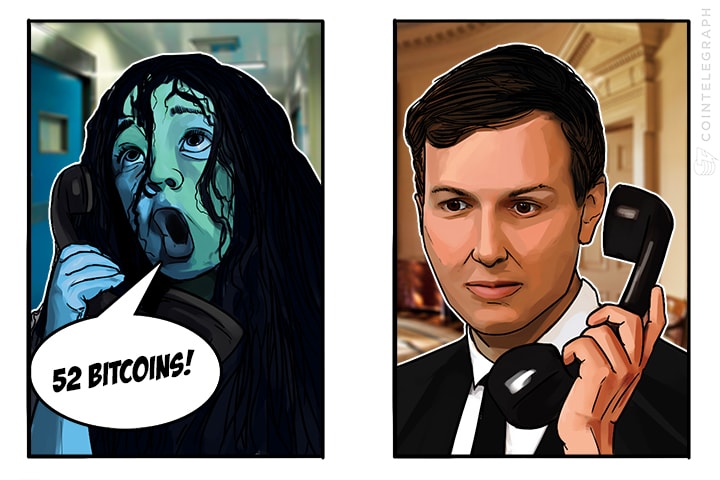Jared Kushner, respondendo perguntas sobre sua colusão com os russos, disse que foi exigido em um e-mail, de "Guccifer 400" a pagar um resgate de 52 Bitcoins ou as declarações fiscais do presidente dos EUA, Donald Trump, serão divulgados.
Guccifer 400 parece ser uma homenagem aparente a Guccifer 2.0, o hacker ou o grupo maligno que os chefes de inteligência tocaram como uma frente de atribuição para o GRU, a diretoria de inteligência militar da Rússia - embora não de forma totalmente convincente.
Ameaça vazia
Aconteceu ser uma ameaça vazia, já que Kushner, que primeiro percebeu que o e-mail era um engano, não agiu com a demanda e os impostos de Trump nunca foram divulgados.
O genro do presidente, sob instrução do serviço secreto, reportou a mensagem e não a respondeu de forma alguma.
"Em 30 de outubro de 2016, recebi um e-mail aleatório de um "Guccifer400", disse Kushner. "Este e-mail, que eu interpretei como um engano, foi uma tentativa de extorsão e ameaçou revelar as declarações fiscais do candidato Trump e exigiu que lhe enviássemos 52 Bitcoin em troca de não publicar essas informações".
Ele continuou:
"Eu levei o email ao conhecimento do agente do Serviço Secreto dos EUA no avião em que estávamos todos viajando e perguntado o que ele achava. Ele me recomendou ignorá-lo e não responder - o que eu fiz. O remetente nunca mais me contatou.
As raízes de Guccifer vão longe
Não parece plausível que este e-mail tenha vindo do notório Guccifer, nem a de sua versão 2.0, pois ambos os hackers estiveram na linha de frente de alguns hacks muito sérios e vazamentos de informações.
Guccifer 2.0 é outra homenagem, ao original que era um hacker romeno de 40 anos chamado Marcel Lazăr Lehel.
Lehel foi quem hackeou Sidney Blumenthal, um confidente de Hillary Clinton e ex-assessor do presidente Bill Clinton. O hacker foi preso pelas autoridades romenas no início de 2014.
A versão 2.0 foi ligada a Roger Stone, um confidente de Trump e um agente político de longa data que parecia ter conhecimento antes de os e-mails do Partido Democrata terem sido vazados pelo WikiLeaks no ano passado.
Jared Kushner, answering questions about his collusion with the Russians, has said he was demanded in an email, from “Guccifer 400” to pay a ransom of 52 Bitcoins or US President Donald Trump’s controversial tax returns would be released.
Guccifer 400 appears to be an apparent homage to Guccifer 2.0, the malicious hacker or group that intelligence chiefs have fingered as an attribution front for the GRU, Russia’s military intelligence directorate - though, not wholly convincingly.
Empty threat
It turned out to be a bit of an empty threat as Kushner, who first perceived the email to be a hoax, did not act on the demand and Trump’s taxes were never released.
The President’s son-in-law, under the instruction of the secret service, informed the message and did not reply in any manner.
“On Oct. 30, 2016, I received a random email from the screen name “Guccifer400,” Kushner said. “This email, which I interpreted as a hoax, was an extortion attempt and threatened to reveal candidate Trump’s tax returns and demanded that we send him 52 Bitcoin in exchange for not publishing that information.”
He continued:
“I brought the email to the attention of the US Secret Service agent on the plane we were all traveling on and asked what he thought. He advised me to ignore it and not to reply—which is what I did. The sender never contacted me again.”
Guccifer’s roots run deep
It doesn't seem plausible that this email came from the notorious Guccifer, nor the 2.0 version as both those hackers have been at the front of some pretty serious hacks and information leaks.
Guccifer 2.0 is another homage, to the original who was a 40-something Romanian hacker called Marcel Lazăr Lehel.
Lehel was the one who hacked Sidney Blumenthal, a Hillary Clinton confidant and former aide to President Bill Clinton. The hacker was arrested by Romanian authorities in early 2014.
The 2.0 version has been tied to Roger Stone, a longtime Trump confidant and political operative who appeared to have foreknowledge about leaked Democratic party emails before their publication by WikiLeaks last year.


